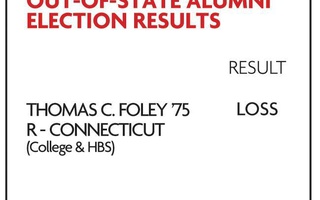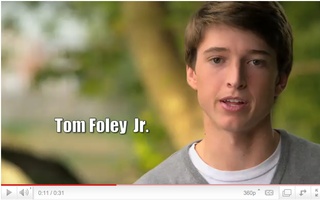The 1994 elections, which gave Republicans control of Congress for the first time since 1947, were a sign of disillusionment with national politics rather than an affirmation of Republican ideology, former House Speaker Thomas S. Foley said yesterday at the Kennedy School of Government.
Foley and political analyst Kevin Phillips told the crowd of 250 that Republicans are claiming a mandate from voters in order to help promote their Contract With America.
"Republicans said [their victories] represented the true will of the electorate...but I don't believe the Contract had much to do with it," Foley said. "That mythology helps the speaker impose on the Republican majority a certain discipline."
Foley said many Democratic politicians--including himself--were defeated both because of their party's failure to produce health care legislation and also because they addressed divisive issues like free trade and gun control.
"What it represents is a repudiation of the president, not an affirmation of the people winning the election," Phillips said.
Phillips, who gained national recognition for his 1967 prediction that a wave of Republican victories sweep the country, said the election signals a growing disillusionment with both political parties--not a "Republican revolution," as current Speaker Newt Gingrich (R-Ga.) has claimed.
"If you've got a revolution happening, people normally like the leader of the revolution," Phillips Although current elected officials are moreexperienced and better educated, and the politicalprocess is more accountable to voters that everbefore, voters still view politicians withdistrust, Foley said. Foley said he worried that this "widespreadfrustration" bodes ill for the nation's future. "It's a dangerous condition in a democracy whenpublic support disappears from its institutions ofgovernment" he said. Phillips predicted that third-party candidateswould surface in future elections to challenge theestablished national parties. "I think what we're seeing is the unraveling ofthe American party system," Phillips said. Foley, who served as U.S. Representative fromWashington from 1965 to 1995, said congressionalleadership has become less dominating over thepast twenty years. As a result, the institutionoften lacks direction and the ability to respondto changing national moods, he said. At a 1965 workshop for newly electedrepresentatives, Foley said, he was admonished bya party leader to "trust the leadership, and,above all else, to follow the speaker." "How right he was," said Foley, who served aschair of the Democratic Caucus and Majority Leaderbefore being elected speaker in 1989. Foley said he was encouraged by Gingrich'sattempts to serve as a strong party leader. Whilehe disagrees with the Republican proposals, hesaid, last November's elections may encourageCongress to become more responsive to the public. "We need to re-examine and reaffirm our purposeand our direction as a nation," Foley said. "Everyinstitution needs criticism; this can producepositive results.
Read more in News
Letters Protest Clark Public Interest PolicyRecommended Articles
-
 Cambridge Russian Spies In N.Y. For Arraignment
Cambridge Russian Spies In N.Y. For Arraignment -
 Alumni for Governor
Alumni for Governor -
 Tom Foley, Jr. in an Ad for Tom Foley
Tom Foley, Jr. in an Ad for Tom Foley -
Friends Rally for Detained JournalistFriends of Clare M. Gillis—Harvard graduate and freelance journalist—urged for more action to bring back captured journalists in Libya at an event on Tuesday.
-
After 43 Days, Gillis Released by Libyan AuthoritiesAfter 43 days of detention by the Libyan authorities, Harvard graduate and freelance journalist Clare M. Gillis was finally released on Wednesday and moved to Rixos Hotel in Tripoli.
-
Harvard Falls To Dartmouth, 3-2After Jillian Dempsey scored Harvard’s second goal of Wednesday night’s contest with 44.5 seconds left to play, the No. 9 Crimson (5-2, 5-2 ECAC) could not find the equalizer against a resilient Dartmouth (4-4-1, 4-2-1) squad, who won, 3-2.













